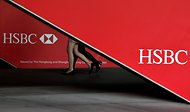HONG KONG — HSBC Holdings, one of Europe’s biggest banks, said Wednesday it would sell its entire stake in a leading Chinese insurer to a Thai conglomerate for 72.7 billion Hong Kong dollars ($9.4 billion.)
HSBC said it would sell its 15.6 percent stake in Ping An Insurance, based in Shenzhen, to the Charoen Pokphand Group, controlled by the Thai billionaire Dhanin Chearavanont, in a deal to be financed partly by the China Development Bank, a policy lender wholly owned by the state of China.
 Bobby Yip/ReutersHSBC headquarters in Hong Kong.
Bobby Yip/ReutersHSBC headquarters in Hong Kong.
HSBC has been shedding assets to cut costs and streamline its business, and at the same time bolstering its balance sheet in the face of tighter global capital requirements for banks. Since Stuart T. Gulliver took over as chief executive at the beginning of 2011, the bank, which is based in London, has sold more than 40 noncore assets and has booked about $4 billion in gains on those sales this year alone.
HSBC disclosed last month that it was in talks over a potential sale of its Ping An stake, which it started building in 2002, and said Wednesday it expected to book a post-tax gain of $2.6 billion on completion of the deal with the Thai company.
‘‘This transaction represents further progress in the execution of the group’s strategy,’’ Mr. Gulliver said in a statement announcing the sale. ‘‘China remains a key market for the group.’’
Founded in Hong Kong and Shanghai almost 150 years ago, HSBC currently operates 133 outlets across 33 branch offices in mainland China. After the Ping An stake sale it will retain minority investments in several Chinese lenders, including a 19.9 percent stake in the Bank of Communications that is worth around $10 billion at current share prices, a stake in Industrial Bank, a midtier institution based in Fujian Province, and an 8 percent stake in the Bank of Shanghai.
The two-part Ping An transaction will see Charoen Pokphand, a conglomerate with businesses ranging from distribution of agricultural products like fresh eggs to operating one of the world’s biggest chains of 7-11 convenience stores, purchase 1.2 billion Ping An shares from HSBC at a price of 59 Hong Kong dollars ($7.61) apiece.
HSBC said it would transfer 21 percent of the shares to the Thai group on Friday. The sale of the remaining 79 percent of the shares at the same price is being financed partly with cash and partly by a loan from the China Development Bank to Charoen Pokphand, and the transfer of those shares is expected to be completed by Jan. 7, contingent on receiving approval from the China Insurance Regulatory Commission.
Shares in Ping An rose 4 percent to 60 Hong Kong dollars in late morning trading in Hong Kong on Wednesday following the announcement — exceeding the stake sale price by 1 dollar in a sign investors are confident the transaction will go ahead. Shares in HSBC rose 1 percent to 79.50 Hong Kong dollars by late morning, and are up around 35 percent in the year to date.
Article source: http://dealbook.nytimes.com/2012/12/04/hsbc-sells-stake-in-chinese-insurer-for-9-4-billion/?partner=rss&emc=rss